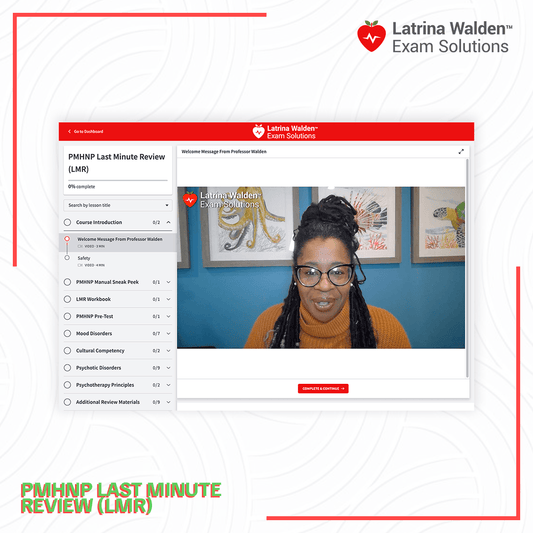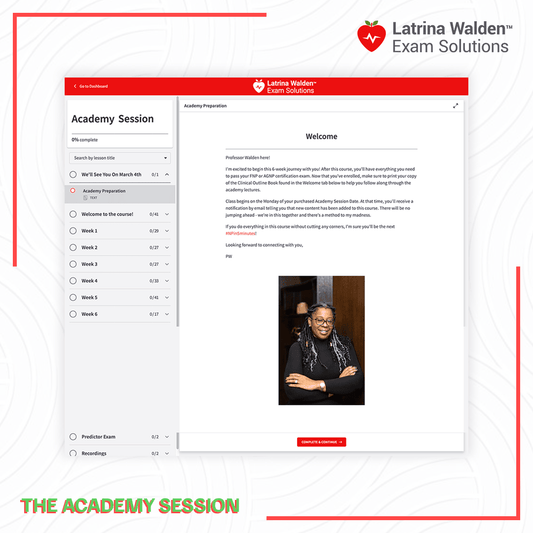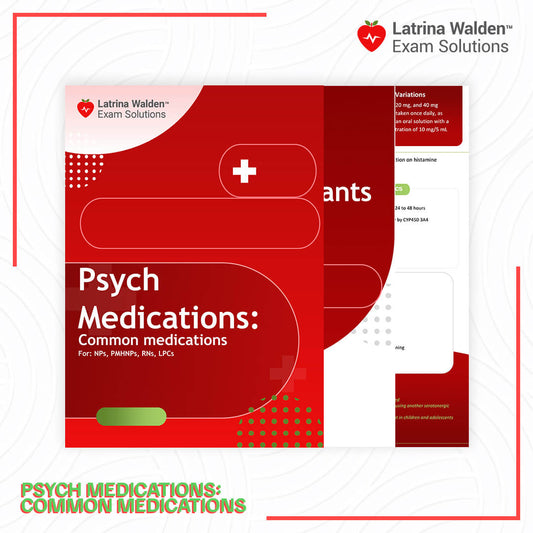Table of Contents
What does PMHNP stand for?
Who is Eligible to Take The PMHNP Exam?
Who Are AANP and ANCC?
What is the Difference between The AANP and ANCC PMHNP Exams?
Exam Content
Question Format
Eligibility Criteria
What does PMHNP stand for?
NPs in general have become invaluable resources in filling niches of healthcare that have historically been occupied by physicians, and mental health is an excellent example of an area where NPs can make a significant difference. National certification by certifying bodies such as ANCC or AANP is necessary to maintain your licensure as a nurse practitioner and recognition by state Boards of Nursing (BONs). By taking and passing a PMHNP board exam, and earning your Psychiatric-Mental Health Nurse Practitioner (PMHNP) certification, you can demonstrate your mastery of the skills and standards of a PMHNP.
Who is Eligible to Take The PMHNP Exam?
ANCC Eligibility Requirements
Applicants for the ANCC PMHNP exam must hold a current, active RN license. They must have a PMHNP master’s, post-graduate certificate, or DNP from an accredited institution. This must include a minimum of 500 faculty-supervised clinical hours, and three separate, graduate-level, APRN Core courses in designated topics. Finally, you must have completed clinical training in at least two psychotherapeutic treatment modalities.
Applicants for the AANP PMHNP exam must have completed a nationally accredited graduate, postgraduate, or doctoral PMHP educational program, including a minimum of 500 clinical practice hours. They must complete the APRN Core, including advanced physical assessment, advanced pharmacology, and advanced pathophysiology. A current professional nursing license is required to process your application.
AANP Eligibility Requirements
Applicants for the AANP PMHNP exam must have completed a nationally accredited graduate, postgraduate, or doctoral PMHP educational program, including a minimum of 500 clinical practice hours. They must complete the APRN Core, including advanced physical assessment, advanced pharmacology, and advanced pathophysiology. A current professional nursing license is required to process your application.
Who Are AANP and ANCC?
The American Nurses Credentialing Center (ANCC) is a subsidiary of the American Nurses Association (ANA) and focuses primarily on credentialing and certification for nurses and nurse practitioners across various specialties. Their exam is known for its comprehensive approach to assessing a nurse practitioner’s knowledge and skills.
The American Association of Nurse Practitioners (AANP) is a professional organization that advocates for the role of nurse practitioners in healthcare. AANP offers a board certification exam that caters specifically to nurse practitioners. This exam is often viewed as more streamlined and concise.
What is The Difference Between the AANP PMHNP and ANCC PMHNP Exams?
Exam Content
One of the most significant differences between the ANCC and AANP board exams is the content they cover. The ANCC exam is generally known for its broader content; it assesses a nurse practitioner’s knowledge in not only the clinical aspects of nursing but also nursing theory, research, and ethics. ANCC board exam questions often require a more extensive understanding of nursing concepts and a comprehensive knowledge base. This material is organized into five key categories: scientific foundation, advanced practice skills, diagnosis and treatment, psychotherapy and related theories, and ethical and legal principles.
The AANP exam focuses primarily on clinical practice and patient care. It emphasizes the application of clinical knowledge and skills, making it more directly related to the day-to-day responsibilities of nurse practitioners. This narrower focus on clinical practice can be appealing to nurse practitioners who want a more pragmatic examination of their capabilities. The two content domains on the AANP PMHNP exam are practice (I) and patient age (II). Domain I is further divided into content categories that you may recognize from the older AANP exams: assessment, diagnosis, planning, and evaluation.
Question Format
In addition to different content, the AANP and ANCC exams differ in the number and format of their questions.
The ANCC exam consists of 175 questions, 150 of which are scored, and the time limit is 3.5 hours. The 15 unscored questions are pretest questions that do not count toward the final score, but are used to evaluate their appropriateness for future exams. The questions are multiple-choice, but there is also a section with alternative question types such as drag-to-match, multiple select (also known as SATA questions or Select All That Apply), and “hot spot” (image-based) questions. In future posts, we’ll discuss these question types in more detail.
The AANP exam consists entirely of multiple choice questions. There are 150 questions, 135 of which are scored; the unscored questions are pretest questions, much like on the ANCC exam. The time limit for the AANP exam is 3 hours.
Eligibility Criteria
ANCC Criteria
- Applicants must hold a current, active RN license in a state or territory of the US or the professional, legally recognized equivalent in another country.
- Applicants must have a master’s degree, post-graduate certificate, or DNP (Doctor of Nursing Practice) from an institution with a program accredited by the Commission on Collegiate Nursing Education (CCNE), the Accreditation Commission for Education in Nursing (ACEN), or the National League for Nursing (NLN) Commission for Nursing Education Accreditation (CNEA).
- Candidates must have taken three separate, comprehensive, graduate-level courses in advanced physiology/pathophysiology, advanced health assessment, and advanced pharmacology (the 3 P’s)
- ANCC requires coursework in health promotion and/or maintenance, differential diagnosis and disease management, and the use and prescription of pharmacologic and nonpharmacologic interventions.
- A minimum of 500 faculty-supervised clinical hours must have been completed.
AANP Criteria
- Completion of a nationally accredited graduate, postgraduate, or doctoral NP education program that is accredited by a nursing accreditation organization recognized by the US Department of Education and/or the Council for HIgher Education Accreditation. Canadian NP programs must be approved by the Canadian Council of Registered Nurse Regulators (CCRNR).
- Applicants must hold a current, active professional nurse license in a state or territory of the US, or a Canadian province or territory.
- AANP requires successful completion of advanced physical assessment, advanced pharmacology, and advanced pathophysiology (the 3 P’s).
At least 500 hours of faculty-supervised direct patient care clinical hours.
Which PMHNP Board Exam Should I Take?
In the world of nurse practitioner board exam certifications, both the ANCC and AANP offer valuable opportunities for advancing your career and demonstrating your expertise. The choice between these two options largely depends on your career goals, clinical focus, and personal preferences. If you value a broader understanding of nursing theory and research, are comfortable with diverse question formats, and are willing to invest in a more comprehensive certification process, the ANCC exam may be the right fit for you.
On the other hand, if you want to focus on clinical practice and prefer a more streamlined certification process, the AANP exam could be a better choice.
Ultimately, the decision should be based on your personal and professional objectives, as both certifications are widely respected in the healthcare field. Contrary to popular opinion, one is not better than the other. Whichever path you choose, achieving board certification as a nurse practitioner is a significant accomplishment that can open doors to a world of opportunity in the ever-evolving healthcare landscape.










